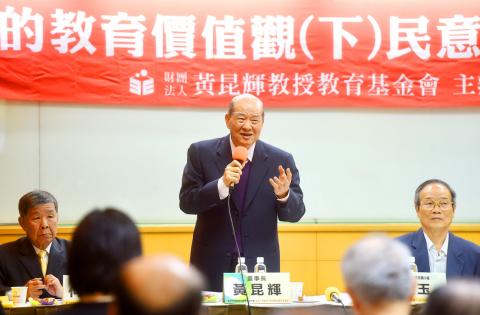A majority of Taiwanese support making English the nation’s second official language and promoting bilingual education, a poll released yesterday by the Professor Huang Kun-huei Education Foundation showed.
Eighty-seven percent of the respondents agreed that English should be Taiwan’s second official language, while 9 percent disagreed, the poll showed.
Eighty-nine percent said that public elementary and junior-high schools should offer bilingual classes taught in Mandarin and English, a practice only allowed at private schools, poll committee member Feng Ching-huang (馮清皇) told a news conference in Taipei.

Photo: Chien Jung-fong, Taipei Times
The National Development Council on Dec. 6 unveiled a blueprint to make Taiwan a bilingual nation by 2030, but whether to list English as the nation’s second official language is still being debated.
National Taiwan Normal University information and computer education professor Ho Rong-guey (何榮桂), who attended the news conference, said that most respondents seemed to support the policy, adding that officials should start working on it soon, for example by preparing bilingual versions of official documents and improving their English proficiency.
Most respondents also said that the nation’s education system needs to be reformed to put more emphasis on thinking, rather than knowledge-oriented instruction that merely helps students obtain diplomas, the poll showed.
Asked whether they agreed with the idea that curricula taught at elementary, junior-high and high schools should encourage students to have a deeper understanding of Taiwanese geography, history and culture, 68.8 percent of respondents said yes, while 26.1 percent said no.
It is curious that the question’s approval rating was less than that of other questions, especially among the group of respondents with higher education, Ho said, adding that the results need to be analyzed further.
Most Taiwanese have progressive educational concepts that echo global trends, so the government should accelerate its educational reforms, foundation chairman Huang Kun-huei (黃昆輝) said.
The telephone survey was conducted from Nov. 27 to Nov. 30 and collected 1,071 valid samples from people older than 20, and has a margin of error of 3 percentage points.

Seventy percent of middle and elementary schools now conduct English classes entirely in English, the Ministry of Education said, as it encourages schools nationwide to adopt this practice Minister of Education (MOE) Cheng Ying-yao (鄭英耀) is scheduled to present a report on the government’s bilingual education policy to the Legislative Yuan’s Education and Culture Committee today. The report would outline strategies aimed at expanding access to education, reducing regional disparities and improving talent cultivation. Implementation of bilingual education policies has varied across local governments, occasionally drawing public criticism. For example, some schools have required teachers of non-English subjects to pass English proficiency

‘FORM OF PROTEST’: The German Institute Taipei said it was ‘shocked’ to see Nazi symbolism used in connection with political aims as it condemned the incident Sung Chien-liang (宋建樑), who led efforts to recall Democratic Progressive Party (DPP) Legislator Lee Kun-cheng (李坤城), was released on bail of NT$80,000 yesterday amid an outcry over a Nazi armband he wore to questioning the night before. Sung arrived at the New Taipei City District Prosecutors’ Office for questioning in a recall petition forgery case on Tuesday night wearing a red armband bearing a swastika, carrying a copy of Adolf Hitler’s Mein Kampf and giving a Nazi salute. Sung left the building at 1:15am without the armband and apparently covering the book with a coat. This is a serious international scandal and Chinese

TRADE: The premier pledged safeguards on ‘Made in Taiwan’ labeling, anti-dumping measures and stricter export controls to strengthen its position in trade talks Products labeled “made in Taiwan” must be genuinely made in Taiwan, Premier Cho Jung-tai (卓榮泰) said yesterday, vowing to enforce strict safeguards against “origin laundering” and initiate anti-dumping investigations to prevent China dumping its products in Taiwan. Cho made the remarks in a discussion session with representatives from industries in Kaohsiung. In response to the US government’s recent announcement of “reciprocal” tariffs on its trading partners, President William Lai (賴清德) and Cho last week began a series of consultations with industry leaders nationwide to gather feedback and address concerns. Taiwanese and US officials held a videoconference on Friday evening to discuss the

PERSONAL DATA: The implicated KMT members allegedly compiled their petitions by copying names from party lists without the consent of the people concerned Judicial authorities searched six locations yesterday and questioned six people, including one elderly Chinese Nationalist Party (KMT) member and five KMT Youth League associates, about alleged signature forgery and fraud relating to their recall efforts against two Democratic Progressive Party (DPP) legislators. After launching a probe into alleged signature forgery and related fraud in the KMT’s recall effort, prosecutors received a number of complaints, including about one petition that had 1,748 signatures of voters whose family members said they had already passed away, and also voters who said they did not approve the use of their name, Taipei Deputy Chief Prosecutor